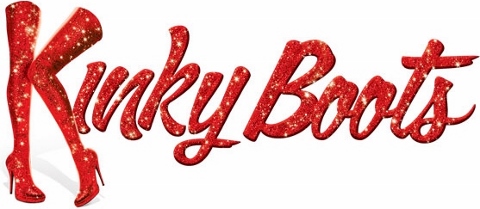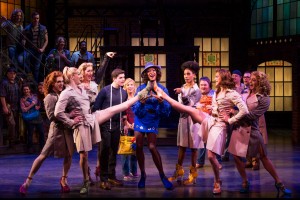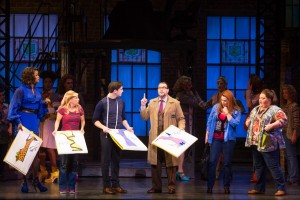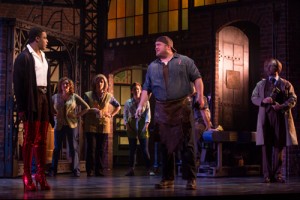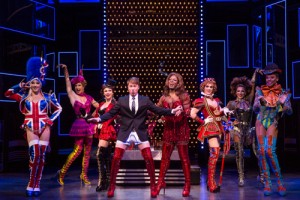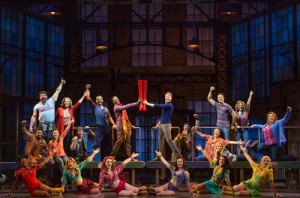THESE BOOTS ARE MEANT FOR WALKING
Oscar Wilde supposedly said, “Be yourself. All the other lives are taken.” That’s defiantly the gospel credo of Kinky Boots, a musical movie spin-off that played Chicago four years ago en route to Broadway fame. It’s returned for a one-week touring engagement at the Oriental Theatre, having garnered a record six 2013 Tony Awards, including Best Musical. Fine-tuned since its shakedown tour, this feel-good, spunky uplifter builds bridges between supposedly hostile worlds, turning a true story into a good time.
It’s easy to see what attracted illustrious composer, bookwriter and lyricist Harvey Fierstein, “Girls Just Want to Have Fun” megastar Cyndi Lauper, and accomplished director/choreographer Jerry Mitchell to this lesser known (and much darker) 2005 film. A celluloid blue-collar variation on the Cinderella saga, the movie spun the tough-loving success story of a family-owned shoe factory founded in 1890 and about to founder. But incongruous fate steps in as its reluctant owner Charlie Price, who fears he’s lost his future with his father, discovers a specialty market for women’s shoes made for men’”i.e., “kinky boots” for drag queens. He finds it in a memorable “fish out of water” encounter with a drag queen impresario who started off as Simon and then became an enchantress named Lola. The film conveys the same sympathy for the underdog as better British second chance/comeback chronicles: The Full Monty, Billy Elliott, Brassed Off, Educating Rita and The Pinter Painters. (Hairspray and The Last Ship also spring to mind.)
Based on actual events, Kinky Boots explores and exploits the unlikely partnership between two very different dreamers with father issues a la Billy Elliott. (Their “Not My Father’s Son” is a male-bonding anthem par excellence.) Charlie Price (supple and good-hearted Adam Kaplan) has inherited his dad’s failing business. But he refuses to turn the redundant factory into condos, abandoning the Northhampton folks who’ve been making shoes for the Prices all Charlie’s life. Then there’s African-British Simon/Lola (young J. Harrison Ghee, riding a thespian rollercoaster), a London drag queen/amateur boxer whose fellow female impersonators need a shoemaker who can give their footwear the necessary strength to fit their size and style. As Lola put it, “Sex Is in the Heel.”
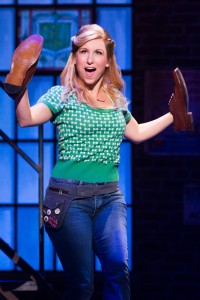 It’s a marriage made in, well, Northampton. Will Lola’s infectious delight in danger (“Land of Lola”) free Charlie from his morose perfectionism and sublimated homophobia, not to mention a control-freak girlfriend? Will Charlie’s work ethic sober up Simon so he can pursue the unsought destiny of a designer? Will the novelty firm Kinky Boots find its niche market or be dismissed as a foot fetish?
It’s a marriage made in, well, Northampton. Will Lola’s infectious delight in danger (“Land of Lola”) free Charlie from his morose perfectionism and sublimated homophobia, not to mention a control-freak girlfriend? Will Charlie’s work ethic sober up Simon so he can pursue the unsought destiny of a designer? Will the novelty firm Kinky Boots find its niche market or be dismissed as a foot fetish?
As it turns out, we do not learn if it succeeds, believe it or not. The action rushes from the provinces to Milan without the necessary middle step showing the triumph of this new footwear in the London drag bars for which it’s intended. In any case the musical still seems more interested in borrowing wholesale from La Cage Aux Folles and its far more entertaining speculations about the different ways to be a man. (A gratuitous boxing match, “In This Corner,” between Simon and a factory lout is no match for Jerry Herman’s “Masculinity” number.)
More questions raise their ugly heads: Will various contrived second-act complications forfeit the show’s supposed compassion for life’s losers? In fact before he’s even sold one pair of boots (“two and a half feet of sex”) to re-brand the family firm, Charlie seeks improbable success at the Milan fashion show. Then he boldly and stupidly decides to hire professional female models to show off men’s footwear. Will this crack-brained entrepreneur, after failing to find the right girls, then decide to strut the runway and show off the boots himself, only to be rescued by Lola at the last minute, even though a few scenes before Charlie had gratuitously questioned Simon’s masculinity? (You guessed right.) Happily, their reconciliation makes much more emotional sense than it did in 2012.
You’d think there’d be at least one scene where Charlie goes to an actual London drag show hotspot and tries to sell some shoes. How long could that take? One week of salesmanship at most? No, it’s Milan or bust! With Charlie as the only model for one harrowing moment, disaster is staved off as Lola’s “Angels” strut their stuff down a triumphant runway, a happy ending that makes no sense the moment you consider the details of this drag queen ex machina ending.
The casting and performances remain first rate and star quality, especially Ghee’s multifaceted Lola/Simon. The assembly-line dance bits, like the first-act finale “Everybody Say Yeah” that features strenuous hoofing on rolling conveyor belts, are infectious delights. The sets by David Rockwell are class-conscious carpentry at its best. Given Gregg Barnes’s glorious costumes, with their eye-popping sequins and leg-loving leather, this romp gives new meaning (and a double pun) to boot camp.
But there remain missed opportunities in Kinky Boots’”and I don’t mean Lauper’s serviceable though familiar pop anthems. (Can you say “throwback”?) Shortfalls lurk: Why is there no attempt to explore and celebrate the common ground of hard luck and social prejudice that could bond the shoe company workers with the drag queens who descend on their factory? (Hint: “The Farmer and the Cowboy Should Be Friends” from Oklahoma!) Why does Charlie have two girlfriends (one predatory, the other a Cyndi Lauper clone) and androgynous or asexual Simon has none? (In this show being gay means wearing women’s clothes, not loving other men’”strange fruit coming from Harvey Fierstein, author of Torch Song Trilogy. And drag shows are promoted as places where audience members who don’t know their orientation can feel “normal by comparison.” Is that all they are?) Some happenings here don’t feel like they came from actual survivors. Happily, Charlie finds downhome-decent affection from loyal local Lauren, a terrific Tiffany Engen who brings down the house with her torch song tribute “The History of Wrong Guys.” Unfortunately, Lauren also delivers the meanest remark of the show: After Charlie expresses his love for her in the final scene, she asks him if he’s gone gay. (How could Fierstein of all souls write such a bone-headed and irrelevant line?)
Basically, it shouldn’t be so hard to connect the failing factory in the first scene with the balls-out, “vogueing”-crazed runway extravaganza that closes the show. Somewhere in between Kinky Boots lost its way–but not its heart, as the ovations declare. There’s truth to mine in breakout bravura numbers like “What a Woman Wants” and “Take What You Got,” celebrations of human sameness despite (gender) differences. Kinky Boots may be a niche market compared to the greater humanity of La Cage Aux Folles but it sure struts’”and sells’”its stuff.
photos by Matthew Murphy
Kinky Boots
North American Tour
presented by Broadway in Chicago
at the Oriental Theatre until September 4, 2016
for tickets, call 213.972.4400 or visit Broadway in Chicago
U.S. tour continues until June 18, 2017
for dates and cities, visit Kinky Boots
